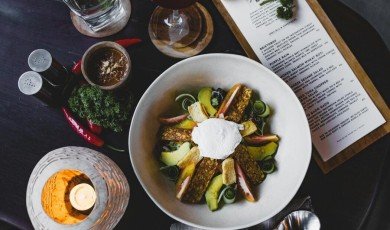
Why Netherlands Restaurants Need Business Translation Services to Operate Internationally
The Netherlands boasts a vibrant culinary scene, with restaurants ranging from traditional dutch eateries to avant-garde dining experiences in cosmopolitan cities like Amsterdam and Rotterdam. Dutch restaurants are increasingly seeking out international customers—food travelers, expats, and global food lovers. However, expanding beyond the borders of the Netherlands comes with unique linguistic and cultural challenges. In today’s fast-paced global market, business translation services have become essential for Netherlands restaurants aiming to thrive internationally. This blog post explores why these services are crucial, delving into their many benefits and shedding light on how professional translation can elevate a Dutch restaurant's global presence.
Understanding the Global Food Market
Tourism is a major contributor to the Dutch economy. According to Statista, over 20 million tourists visit the Netherlands each year, many of whom flock to its renowned restaurants. In an age of increasing globalization, Dutch restaurants are not limited to serving local diners; they cater to tourists, business travelers, and culinary enthusiasts from around the world. Seamless communication is key to delivering a fantastic international guest experience, and this extends beyond just offering menus in English.
The Language Barrier
Every Dutch restaurant aiming for global success must overcome the language barrier. Menus, websites, promotional materials, and even reservation systems need to be accessible in the languages of their target markets. While translation apps can provide basic assistance, only professional business translation services ensure accuracy, cultural appropriateness, and a polished image.
- Menus: Accurate and enticing menu translations can make or break the dining experience. Poor translation might confuse international guests, resulting in dissatisfaction or lower sales.
- Brand Messaging: A restaurant's story, philosophy, and values must come across clearly and authentically in any language. Miscommunication can erode trust and brand reputation.
- Marketing Materials: Flyers, social media ads, websites, and newsletters must appeal to local cultures and customs. Well-translated marketing materials resonate with audiences and encourage more bookings.
Legal Compliance and Document Translation
Expanding internationally means navigating complex legal environments. Restaurants may need to translate contracts, health and safety guidelines, food allergen information, employment forms, and supplier agreements. Here, legal document certified translation services are vital. Certified translations guarantee accuracy and authenticity—elements required by regulatory bodies and international partners alike.
Certification isn't just about accuracy; it’s about meeting legal standards in foreign jurisdictions. Failing to provide certified translations can lead to regulatory fines, reputational damage, and even international legal disputes. Whether registering a trademark, filing tax documents, or complying with E.U. regulations on food labeling, professional certification from a trusted provider eliminates these risks.
Reaching a Diverse Clientele
The global food scene is more competitive than ever. Dutch restaurants aspiring for international recognition must cater to a diverse audience—French tourists, German business travelers, Chinese foodies, and more. Multilingual communication is a strong competitive edge. For example, Chinese guests may appreciate a Mandarin menu and localized payment options; German visitors might prefer details on food sourcing and sustainability in their own language.
Thoughtful translation demonstrates respect, hospitality, and professionalism. It enhances guest satisfaction, encourages positive reviews, and fosters repeat business. Additionally, satisfied guests are more likely to share their experiences on social media, generating organic international publicity for your restaurant.
What Are Business Translation Services?
Business translation goes beyond word-for-word dictionary translation. It encompasses the adaptation of company materials—menus, contracts, correspondence, and manuals—taking into account industry jargon, cultural nuances, and specific audience needs. It aims to enable smooth, clear, and effective international communication. Want an expert answer to what business translation services are? These services are especially relevant in the hospitality industry, where attention to detail is paramount.
Challenges Faced Without Professional Translation
Without quality business translation, restaurants face tangible risks:
- Miscommunication: Inaccurate translations lead to confused guests, misplaced orders, and unsatisfactory dining experiences.
- Legal exposure: Errors in legal documents or food allergen declarations can cause regulatory issues or even lawsuits.
- Brand dilution: Poor translation can make a restaurant look unprofessional, damaging its reputation.
- Lost revenue: Guests who do not understand the menu or booking process may choose competitors, resulting in reduced bookings.
Benefits of Partnering with Experts
Investing in professional translation services empowers Dutch restaurants to grow globally. Key benefits include:
- Accuracy and Consistency: Professional linguists ensure that all translated materials maintain the original tone, brand, and intent.
- SEO and Digital Visibility: Well-translated websites rank higher in local search engines, drawing more traffic from international guests searching in their own language.
- Compliance: Certified translation services provide legally valid documents tailored to international regulations and standards.
- Brand Strength: Consistent messaging across platforms establishes a strong, recognizable presence worldwide.
- Customer Experience: Multilingual support and clear information boost customer satisfaction and loyalty.
Real-World Success Stories
Consider the rise of Dutch fusion restaurants in major cities abroad—Tokyo, New York, Berlin—each adapted their branding, menus, and storytelling for local markets. Their investment in skilled translation and localization not only preserves Dutch culinary culture but also tailors the experience to local tastes and legal standards. The result? Rave reviews, international awards, and packed tables.
Conclusion: Unlocking Global Opportunities
As Dutch restaurants eye international success, business translation flourishes as an indispensable tool for growth. Sure, memorable flavors and unique Dutch cuisine open doors—but clear, culturally aware, and legally sound communication ensures those doors stay open. Whether you’re a cozy bistro on a canal or a cutting-edge culinary hotspot, investing in professional business translation services is a recipe for international acclaim.
Ready to take your Dutch restaurant to the world stage? Discover how business translation services and legal document certified translation services can transform your international operations—turning linguistic hurdles into gateways for growth and global recognition.
Don’t let language barriers hold back your restaurant’s potential. By bridging cultural gaps through expert translation, Dutch restaurants can secure a loyal global clientele, comply with international regulations, and build a reputation that spans continents. Related article: Why Leicester's Pubs and Restaurants Need Business Translation Services to Attract International Customers







